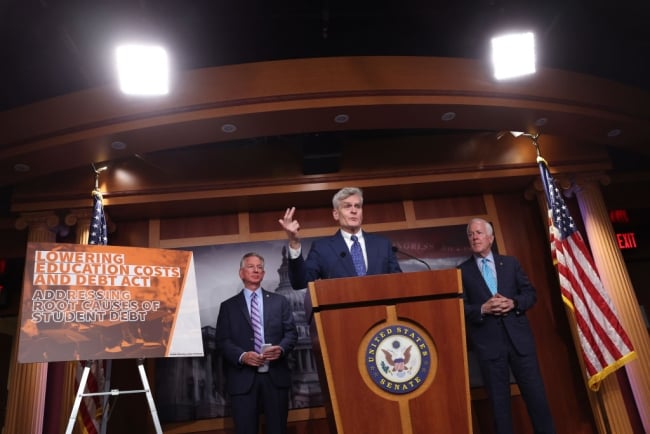You have /5 articles left.
Sign up for a free account or log in.

Sen. Bill Cassidy, a Republican from Louisiana, is spearheading the Senate plan for higher education reform.
Kevin Dietsch/Getty Images
Senate Republicans want to eliminate so-called inflationary loans, stop federal aid for degrees that leave students worse off and expand the Pell Grant to workforce training programs as part of a draft plan released late Tuesday evening to overhaul higher education policy.
The 71-page legislation is part of the Senate’s response to the One Big Beautiful Bill Act, which passed the House last month and is designed to fund President Donald Trump’s tax cuts, his crackdown on immigration and other top agenda items.
The Senate Health, Education, Labor and Pensions Committee drafted the higher education portion of the legislation. As expected, the plan mirrors the House bill in many ways, as it calls for significant changes to the federal student loan system. For instance, both plans would end Grad PLUS loans and restrict the Parent PLUS program.
But the Senate has a different plan to hold colleges accountable, nixing the House’s proposed risk-sharing model, under which colleges would have to pay a fee for their graduates’ unpaid loans, for a measure like gainful employment. Under the Senate plan, colleges would have to report their average postgraduate income levels and could lose access to federal aid, depending on students’ earnings and debt. The Senate bill also omits a provision from the House bill that would exclude part-time students from the Pell Grant. Over all, the changes in the Senate bill would save $300 billion over 10 years compared to the House bill, which would save $350 billion.
“American higher education has lost its purpose. Students are graduating with degrees that won’t get them a job and insurmountable debt that they can’t pay back,” said Sen. Bill Cassidy of Louisiana, the Republican chair of the HELP committee, in a news release. “We need to fix our broken higher education system, so it prioritizes student success and ensures Americans have the skills to compete in a 21st century economy. President Trump and Senate Republicans are focused on delivering results for American families and this bill does just that.”
Lawmakers are using the process known as reconciliation to advance the legislation, so it only needs 51 votes to pass the high chamber instead of the typical 60 votes. But before senators can vote, the Senate Budget Committee and then the parliamentarian will have to scrutinize the various provisions and ensure they adhere to the reconciliation rules. For example, the policy changes must have a budgetary impact and be within the jurisdiction of the committee that proposed it.
President Donald Trump has set an ambitious July 4 deadline to sign the measure into law, which would require quick action from the Senate.
From the beginning of the Trump administration in January, House Republicans have been pushing a more radical plan with steep cuts to key welfare programs like Medicaid, the Supplemental Nutrition Assistance Program and, most recently, student financial aid like the Pell Grant. Meanwhile, senators have talked about more modest, though still significant, spending cuts.
Now, Republicans from both chambers will have to get on the same page if they want to meet their deadline. All the while, lobbyists, policy analysts and political figures—including former Trump adviser Elon Musk—are expected to come at the bill from every angle with critiques.




